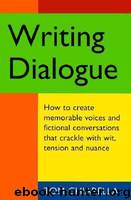Writing Dialogue by Tom Chiarella

Author:Tom Chiarella [Chiarella, Tom]
Language: eng
Format: epub
Published: 2011-03-29T07:00:00+00:00
This sort of list can be a rich and important source of detail for your stories.
5. Quiet the narrator. Write a back-and-forth narrative (in which the first character speaks, followed immediately by the other, followed immediately by the first character and so on), but don't put in any of the details of the physical world. Use a simple "he said," "she said" format, but remember, no locations, no "props," no background. The scene should involve something urgent, but not dangerous, so the characters feel compelled to speak (such as have an argument), but not so urgent they are reacting to the world around them (not a rainstorm) . After ten exchanges, allow yourself one, well-chosen physical detail within the dialogue and no more. Press the dialogue to an appropriate moment of silence. Once finished, examine. Are the elements of story there? What's missing? How can you press that into the exchange without employing the narrative voice? Do it.
All my life the people around me have been dancing a strange two-step with radio, TV and the movies. I have friends who never listen to the radio, because they consider talk radio declasse or they like picking their own music. I have another set of friends that never watches television, for the usual set of reasons: too mindless, too predictable, bland writing, fuzzy sentiments. Many people I know share the same feelings about movies, particularly commercial ones, which tend to be written and rewritten so often they become a mishmash of homogenized ideas. I accept all of that as the general truth.
It is tempting to say to the fiction writer, "Avoid radio! Turn off the television! Reject 'Hollywood' movies!" It's pretty easy for me to see what's wrong with all three of these vehicles. But, quite frankly, I do "connect" with all three. I listen to radio, I watch television and I go to movies. To say that I get nothing from them, no sense of the way language does and doesn't work, would be a lie. I love good writing, and despite what you may have heard, there's a lot of it going on in these media. What this chapter does is ask you to rethink the way you use them. Instead of listening to the radio, I want you to see it. Don't watch television, listen to it. Don't just go to the movies, read them. You'll find lots of the bad, some of the good and a few places to start turning the lessons into good fiction.
EYES CLOSED
When there's a decent AM radio station on in the background, I enjoy almost everything about a long drive. I like the cup of coffee in the crappy cup in the drink holder. I like the pace of the interstate. I like the whine and pop of the AM dial, better than the filtered hiss of FM. The less music, the better. I go AM because I listen for talk. I like the stray phrases I catch—the cloying sentiment of the religious
Download
This site does not store any files on its server. We only index and link to content provided by other sites. Please contact the content providers to delete copyright contents if any and email us, we'll remove relevant links or contents immediately.
Asking the Right Questions: A Guide to Critical Thinking by M. Neil Browne & Stuart M. Keeley(5766)
Autoboyography by Christina Lauren(5230)
Eat That Frog! by Brian Tracy(4528)
Dialogue by Robert McKee(4392)
Sticky Fingers by Joe Hagan(4192)
Journeys Out of the Body by Robert Monroe(3622)
Annapurna by Maurice Herzog(3465)
Full Circle by Michael Palin(3445)
Schaum's Quick Guide to Writing Great Short Stories by Margaret Lucke(3377)
Elements of Style 2017 by Richard De A'Morelli(3344)
The Art of Dramatic Writing: Its Basis in the Creative Interpretation of Human Motives by Egri Lajos(3064)
Atlas Obscura by Joshua Foer(2956)
Why I Write by George Orwell(2948)
The Fight by Norman Mailer(2931)
The Diviners by Libba Bray(2930)
In Patagonia by Bruce Chatwin(2923)
The Mental Game of Writing: How to Overcome Obstacles, Stay Creative and Productive, and Free Your Mind for Success by James Scott Bell(2907)
Venice by Jan Morris(2572)
The Elements of Style by William Strunk and E. B. White(2471)
